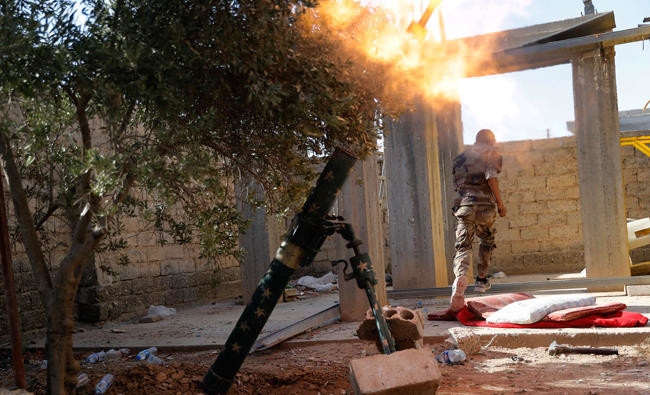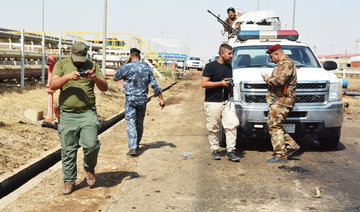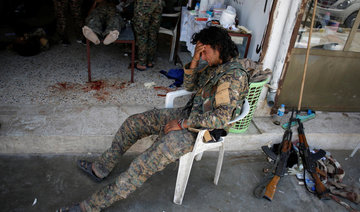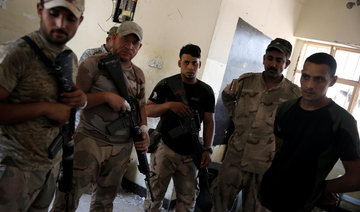BEIRUT: Daesh has lost swathes of territory in its self-declared caliphate in recent months, including its former Iraq hub Mosul and 90 percent of its onetime Syria bastion Raqqa. Here are the main battlefronts where Daesh is under attack in Syria and Iraq:
RAQA: Raqqa was once the de facto Syrian capital of Daesh’s self-declared caliphate, but the group has now lost 90 percent of the city to US-backed fighters. The Syrian Democratic Forces, an alliance of Kurdish and Arab fighters, worked for months to encircle the city, which had become a byword for the worst of Daesh’s atrocities during its years under militant rule. In June, the SDF broke into the city for the first time and, with support from a US-led coalition, now controls 90 percent of it, according to the Syrian Observatory for Human Rights. The battle initially moved quickly, but slowed when the SDF reached the more densely populated city center. Its advance has been assisted by heavy US-led air strikes that have reportedly killed hundreds of civilians. Estimates of the number of civilians still in the city range from fewer than 10,000 to as many as 25,000.
DEIR EZZOR: Daesh’s other main stronghold in Syria is the eastern province of Deir Ezzor, which borders Daesh-held territory in Iraq. Two separate offensives are under way against the militants in the area — one by the US-backed SDF, the other by Russian-backed government forces. Regime troops advanced across the desert from the west to relieve two besieged garrisons in the city of Deir Ezzor, down the Euphrates Valley from Raqqa. The army now controls around 70 percent of the city and is battling to oust Daesh from the remainder, according to the Britain-based Observatory. The SDF advanced from the north to assault Daesh on the east bank of the Euphrates, capturing more than 500 square km of territory, according to the US-led coalition. On Monday, government forces crossed to the east bank of the river, where commanders said they came under fire from the SDF. Moscow said the US-backed force was impeding the battle against Daesh, a charge dismissed by Washington.
OTHER POCKETS: Daesh also holds pockets of territory elsewhere, notably in eastern parts of the central provinces of Homs and Hama, where it is the target of another Russian-backed offensive by government forces. The militants are present in smaller numbers in the Yarmuk camp in south Damascus and a group allied with Daesh has a scattered presence in southern parts of Syria.
EUPHRATES VALLEY: Daesh controls a section of the Euphrates Valley downstream from the Syrian border, including the towns of Al-Qaim, Rawa and Anna. This week, Iraqi forces backed by paramilitary units and coalition warplanes launched a push up the valley, attacking Anna and recapturing several villages. After retaking Anna, Iraqi forces are expected to target Rawa and finally Al-Qaim, which is close to the Syrian border.
HAWIJA: Security forces and paramilitary units are also preparing an assault on the other remaining Daesh-held enclave in Iraq, centered on the town of Hawija. The enclave, which was bypassed by government forces in their drive north to second city Mosul last year, lies to the west of the ethnically divided Kurdish-held city of Kirkuk and includes several other mainly Arab towns. Preparations for the operation have been overshadowed by a bitter dispute between Baghdad and Iraqi Kurdish leaders over their plans to hold an independence referendum on Monday in areas including Kirkuk.
Major battlefronts against Daesh in Syria and Iraq
Major battlefronts against Daesh in Syria and Iraq

Qatar and Egypt plan talks with Hamas on Gaza ceasefire: White House

- Sullivan said he had spoken briefly to one of the main interlocutors, Qatar’s Prime Minister Sheikh Mohammed bin Abdulrahman Al Thani, and that they would speak again about Gaza on Sunday while both are in Switzerland for the Ukraine conference
BUERGENSTOCK, Switzerland: White House national security adviser Jake Sullivan said on Saturday that mediators for Qatar and Egypt plan to engage Hamas militants soon to see if there is a way to push ahead with a Gaza ceasefire proposal offered by US President Joe Biden.
Sullivan spoke to reporters on the sidelines of a Ukraine peace summit and was asked about diplomatic efforts to get an agreement for Hamas to release some hostages held since Oct. 7 in exchange for a ceasefire lasting at least six weeks.
Sullivan said he had spoken briefly to one of the main interlocutors, Qatar’s Prime Minister Sheikh Mohammed bin Abdulrahman Al Thani, and that they would speak again about Gaza on Sunday while both are in Switzerland for the Ukraine conference.
Hamas has welcomed the ceasefire proposal, but insists any agreement must secure an end to the war, a demand Israel still rejects. Israel described Hamas’s response to the new US peace proposal as total rejection.
Sullivan said that US officials have taken a close look at Hamas’s response.
“We think some of the edits are not unexpected and can be managed. Some of them are inconsistent both with what President Biden laid out and what the UN Security Council endorsed. And we are having to deal with that reality,” he said.
He said US officials believe there remains an avenue to an agreement and that the next step will be for Qatari and Egyptian mediators to talk to Hamas and “go through what can be worked with and what really can’t be worked with.”
“We anticipate a back-and-forth between the mediators and Hamas. We’ll see where we stand at that point. We will keep consulting with the Israelis and then hopefully at some point next week we’ll be able to report to you where we think things stand and what we see as being the next step to try to bring this to closure,” he said.
Beirut airport busy with Eid visitors despite tense security situation

- Motorcyclist killed in Israeli drone strike as Hezbollah keeps up retaliatory attacks
- Festival brings challenges for Lebanese forced to flee their homes
BEIRUT: Beirut’s Rafic Hariri International Airport witnessed an influx of arrivals on Saturday as Lebanese expatriates and tourists ignored the hostilities in the south and traveled to celebrate the Eid Al-Adha holiday.
European embassies had earlier issued warnings against visiting Lebanon because of the tense security situation, but these failed to deter expatriates and visitors, mainly from Iraq and Egypt, arriving for Eid.
On the eve of the holiday, there was a noticeable discrepancy in the prices of sacrificial animals in the Lebanese market, along with an unjustified increase in meat prices.
Majed Eid, secretary of the Syndicate of Butchers, Importers, and Traders of Live Livestock, said that imports of sacrificial animals from abroad had fallen this year compared with previous years.
The security situation in the Tyre area has led to reduced shopping activities as Eid approaches, despite the substantial influx of expatriates who typically boost commercial and economic activity there.
Tyre Traders Association Secretary Ghazwan Halawani said that the preparations for Eid seemed ordinary, with no noticeable improvement in commercial activity, sales, or market visitors.
He attributed the decline to anxiety over military operations on the border and Israeli attacks on civilians.
On the eve of Eid Al-Adha, thousands of families from the southern region headed to their villages near the border despite the hostilities.
Issa, a butcher, planned to spend the holiday with his family, even though his area had been sporadically shelled in the past few months.
“Nothing will happen to us except what God has destined for us,” he said.
The Eid holiday will be challenging for the people of the south, especially those who fled their villages eight months ago.
Eid Al-Adha presents significant challenges for the displaced southerners, with almost 100,000 people forced to leave their villages.
Nabatieh Gov. Hwaida Turk told Arab News that 65 towns in Nabatieh Governorate had been subjected to “systematic shelling and fires due to Israeli attacks.”
Some towns were almost destroyed, she said.
Turk said that residents of the front-line towns, especially in the Marjayoun and Hasbaya areas, did not return for Eid.
However, villages and towns to the rear are crowded with displaced people alongside their original inhabitants.
She said the people in the southern region tried to celebrate Eid with hope despite the difficult economic conditions.
Hezbollah kept up retaliatory attacks on Israel on Saturday, days after an airstrike killed one of its commanders.
Aerial attacks on both sides escalated, with Hezbollah saying that it carried out an attack “with a fleet of suicide drones on the Khirbet Maer base, destroying part of it.”
The attack was in response to the killing of a senior Hezbollah commander, Sami Hassan Taleb, nicknamed Abu Taleb, along with three others, in an Israeli attack on their location in Jouaiyya several days ago.
Israeli Army Radio reported that a fire erupted in the Goren settlement in western Galilee after several Hezbollah drones struck the area.
As part of the escalation, Hezbollah targeted the headquarters of the air surveillance and operations management unit at the Meron base.
Israeli media outlets said that “two anti-armor missiles launched from the Meron base were targeted.”
Hezbollah said that it struck a group of Israeli soldiers at the Hadab Yaron site with a missile, killing or injuring several.
An Israeli military drone strike early on Saturday killed a motorcyclist at the Bint Jbeil–Maroun Ras intersection. Another person was injured in the resulting fire.
The outskirts of Deir Mimas and the Aaziyyeh Hill were subject to phosphorus shelling, causing fires to erupt in forests.
Israeli army spokesperson Avichay Adraee claimed that “an air force plane targeted a Hezbollah vandal in Aitaroun,” adding that “the Israeli army shelled the area with artillery.”
Palestinian teenager killed in West Bank raid

- Israel has killed at least 37,296 Palestinians in Gaza, mostly civilians, according to the territory’s health ministry
RAMALLAH: The Palestinian Health Ministry said Israeli troops shot dead a Palestinian teenager in the occupied West Bank on Saturday, as an army official confirmed troops opened fire during a raid.
Sultan Abdul Rahman Khatatbeh, 16, was killed by Israeli fire in the northern West Bank town of Beit Furik, the ministry said in a statement published on Facebook.
Palestinian news agency Wafa reported that two others were injured when Israeli forces stormed the town east of Nablus, “firing live bullets at local residents.”
HIGHLIGHTS
• Sultan Abdul Rahman Khatatbeh, 16, was killed by Israeli fire in the northern West Bank town of Beit Furik.
• Two others were injured when Israeli forces stormed the town east of Nablus, ‘firing live bullets at local residents.’
An Israeli military official said that troops were operating in the Nablus area when “dozens of suspects hurled rocks at Israeli security forces, who responded with riot dispersal means and live fire.”
“Hits were identified,” the official said.
The West Bank, which Israel has occupied since 1967, has seen a surge in violence for more than a year, particularly since the Israel-Hamas war in Gaza erupted on Oct. 7.
At least 546 Palestinians have been killed in the territory by Israeli troops or settlers since the Gaza war broke out, according to Palestinian officials.
At least 37,296 Palestinians have been killed in Israel’s military campaign, according to the Gaza Health Ministry.
Also on Saturday, the armed wing of Palestinian Islamic Jihad said the only way to return Israeli hostages is through Israel’s withdrawal from Gaza, ending its offensive and reaching a deal for exchanging Israeli hostages for Palestinian prisoners.
The spokesman of Al-Quds Brigades, the armed wing of the Palestinian group, made the remarks in a video posted on Telegram.
‘Miscalculation’ could lead to wider Hezbollah-Israel conflict, say UN officials

- “The danger of miscalculation leading to a sudden and wider conflict is very real,” the two officials said
- The United States and France are working on a negotiated settlement to the hostilities along Lebanon’s southern border
BEIRUT: There is a “very real” risk that a miscalculation along Lebanon’s southern border could trigger a wider conflict between Hezbollah and the Israeli military, two UN officials in Lebanon warned on Saturday.
The United Nations special coordinator for Lebanon, Jeanine Hennis-Plasschaert, and the head of UN peacekeeping forces in Lebanon, Aroldo Lazaro, said they were “deeply concerned” about the recent escalation along Lebanon’s border.
Iran-backed Hezbollah last week launched the largest volleys of rockets and drones yet in the eight months it has been exchanging fire with the Israeli military, in parallel with the Gaza war.
“The danger of miscalculation leading to a sudden and wider conflict is very real,” the two officials said in a written statement on Saturday.
The United States and France are working on a negotiated settlement to the hostilities along Lebanon’s southern border. Hezbollah says it will not halt fire unless Israel’s military offensive on Gaza stops.
Egyptian president tours Prophet’s biography museum

- El-Sisi explored the various creative pavilions that illustrate aspects of the Prophet Muhammad’s life
RIYADH: Egyptian President Abdel Fattah El-Sisi visited the International Fair and Museum of the Prophet’s Biography and Islamic Civilization in Madinah, Saudi Press Agency reported on Saturday.
During his tour on Friday, El-Sisi explored the various creative pavilions that illustrate aspects of the Prophet Muhammad’s life.
He viewed the panorama of the prophet’s chamber, which showcases authentic details of its construction and development through to the modern era.
El-Sisi was also introduced to a simulation of the Prophet’s pulpit, displayed through models and smart interactive screens. The exhibition highlighted the Kingdom’s efforts in serving the Qur’an and the Two Holy Mosques.
Expressing his admiration for the exhibition and museum project, El-Sisi extended his gratitude to King Salman and Crown Prince Mohammed bin Salman for their efforts and hospitality.





















